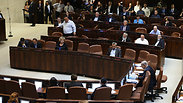
How can Zionist parties oppose the Nationality Bill?
Op-ed: What seemed like a unique opportunity to hold a fundamental and serious discussion on the State of Israel’s definition, without right-wing and left-wing labels, ended with an automatic opposition lacking any national logic.
Comparisons are always a sin, but the current Knesset appears to be characterized by higher than usual levels of populism and superficiality. Listen to the statements, watch the actions, and you’ll understand why the public’s trust in the political system is wearing off.
The political system is preoccupied with the Israel Public Broadcasting Corporation (IPBC), while no one understands the difference between the proposals and the reason behind the waste of time and money. It is preoccupied with arrogant threats that never come to fruition, talking about “how right-wing they are” and then doing exactly what the left-wing would do, and vice versa.
And now, a unique opportunity has been created to discuss the question of our self-identity. The Nationality Bill, which I have supported since the moment it was conceived, could have served as a platform for a serious discussion of an essential question. Israeli politicians are allowed to do so as well.

The bill was adopted by the Kadima party a decade ago. Avi Dichter, the initiator of the current law, is also the original initiator. He was backed by the party’s leaders, including Tzipi Livni. The idea was simple: As the State of Israel has no constitution, the checks and balances characterizing us should be legally defined and enforced. Israel has a Basic Law of Human Dignity and Liberty, an important and influential law about our democratic nature, but there is no proper legal definition of us being a nation-state.
This is how the Supreme Court turned into a national inventor of excuses. Every time Palestinians ask for a family reunion, the court objects for security reasons (which clearly cannot be true in all cases, statistically speaking).
Every time Israeli Arabs are asked—and rightfully so—how come Arabic is an official language, yet the Knesset publishes its decisions exclusively in Hebrew and the courts are in Hebrew and the street numbers are in Hebrew, someone replies something and mumbles an explanation. Always vague, always lacking a definition. Well, the truth is that just like fog of war benefits guerilla forces and un-organized armies, rhetoric fog is convenient for a state under construction—a state which does not know, succeed or want to define itself, and definitely not a state which has existed for almost 70 years.
Absurdly, in the past few years, the greatest opposition has come from the direction of Prime Minister Benjamin Netanyahu of all people. He perceives basic laws as a headache. The Haredim don’t like them, the political system rages, and the process requires decisions.
Netanyahu’s ideology is in the law, but who’s talking about ideology here? And as it happens, a propitious time has come upon us. Netanyahu of the past year can no longer say no to a law discussing a nation-state, especially in light of the opponents.
Allegedly, this is a cause for celebration, but it’s a cause for concern as well. When a law turns into another Pavlovian response, there are too few Israelis who understand and are part of it, and much more Israelis and lawmakers whose only wish is to poke themselves in the eye and say 'to hell with the laws.'
My guess is that Yesh Atid or the Zionist Union hardly held any serious in-depth discussions about the law. As a matter of fact, I wouldn’t be surprised if apart from Dichter, Netanyahu and Ministers Ze’ev Elkin and Yariv Levin, no one in the Likud delved into it either.
So for the sake of those who decide based on the other side, here are the clauses: The State of Israel is the Jewish people’s national home, a Jewish and democratic nation-state in the spirit of the Declaration of Independence.
The anthem is Hatikva, the flag is blue and white with a Star of David, the emblem is a menorah, the capital is Jerusalem, the state’s language is Hebrew (Arabic has a special status, and its speakers have full accessibility rights), Independence Day is an official holiday, Memorial Day and Holocaust Day are official days. An ingathering of the exiles and the Law of Return. Religious and cultural rights for everyone, regardless of religion or nationality. Official statutory holidays according to the Hebrew calendar, and for members of other religions according to their heritage.
And so, in summary, the lawmakers sought to reinforce what was espoused by the state’s founders and what balances us as a democratic nation-state. Those who don’t believe it should put in the effort and read the law for himself.
I can understand the turmoil coming from those who oppose the Zionist idea, but from the Zionist Union and Yesh Atid? What exactly are they objecting to? The populism around the law is harmful, but it’s no excuse to avoid a serious discussion of a serious law.










